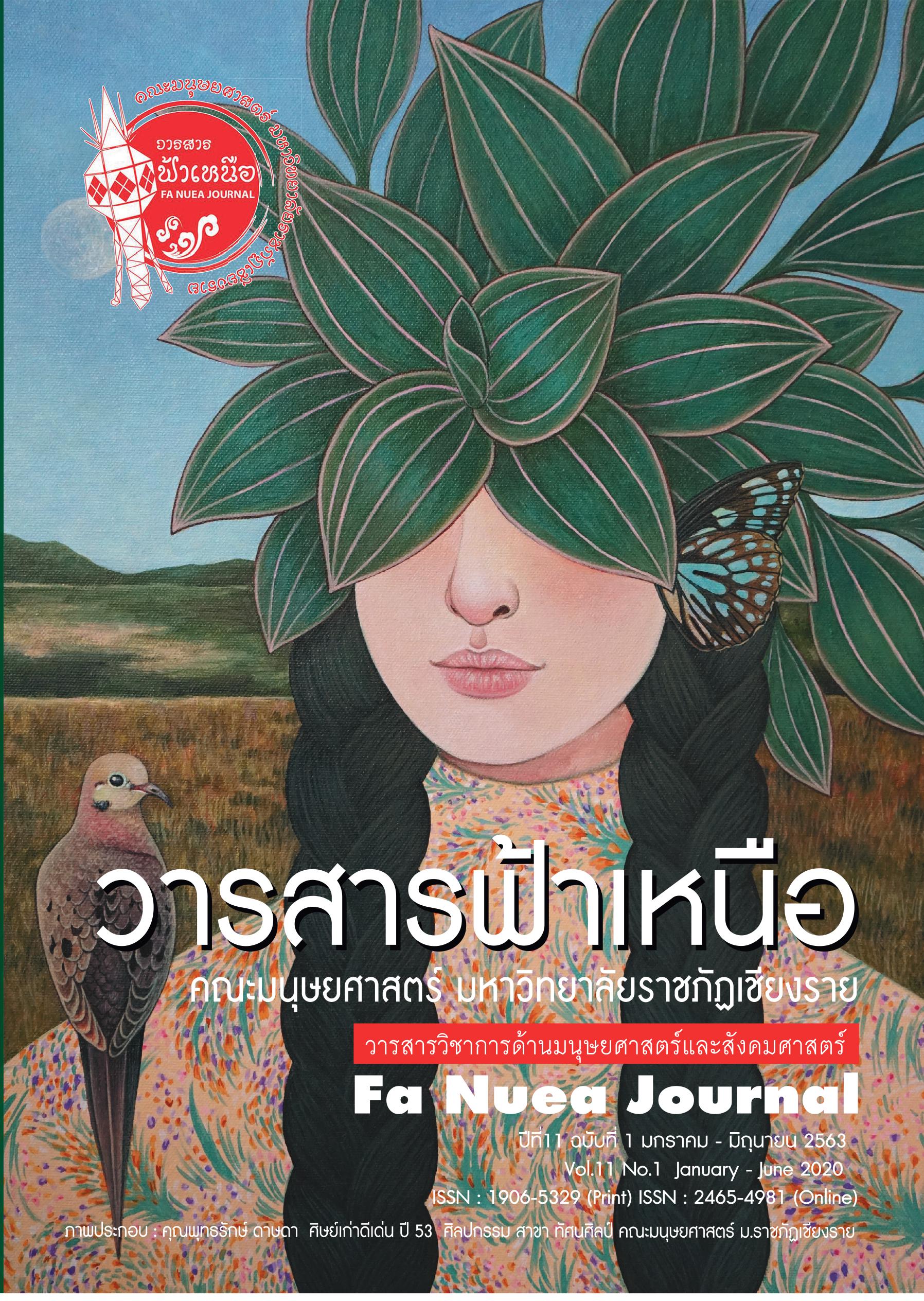การศึกษาสภาพปัญหาการฝึกประสบการณ์วิชาชีพภาษาญี่ปุ่น ณ ประเทศญี่ปุ่น ของนักศึกษาสาขาวิชาภาษาญี่ปุ่น คณะมนุษยศาสตร์ มหาวิทยาลัยราชภัฏเชียงราย
Main Article Content
บทคัดย่อ
บทความนี้มีจุดประสงค์เพื่อศึกษาสภาพปัญหาการฝึกประสบการณ์วิชาชีพภาษาญี่ปุ่น ณ ประเทศญี่ปุ่น ของนักศึกษาสาขาวิชาภาษาญี่ปุ่นคณะมนุษยศาสตร์ มหาวิทยาลัยราชภัฏเชียงราย จำนวน 9 คน ระยะเวลา 3เดือน โดยใช้แบบประเมินความพึงพอใจต่อนักศึกษาฝึกประสบการณ์วิชาชีพของสถานประกอบการในประเทศญี่ปุน่ ซึ่งมี 2 ขอ้ ได้แก่ทักษะด้านนภาษาและทักษะด้านการปฏิบัติงาน และรายงานผลการฝึกประสบการณ์วิชาชีพของนักศึกษาทั้งนี้เพื่อนำผลการศึกษาไปเป็นแนวทางในการพัฒนา ปรับปรุงการจัดการเรียนการสอนในหลักสูตร ผลการศึกษาพบว่าผู้ประกอบการมีความพึงพอใจตอ่ ทักษะด้านภาษาของนักศึกษาระดับปานกลาง โดยต้องการให้หลักสูตรพัฒนาทักษะด้านการสนทนาและการฟังภาษาญี่ปุ่นใหดี้ขึ้น และความพึงพอใจต่อทักษะด้านการปฏิบัติงาน อยู่ระดับดี ส่วนข้อเสนอแนะอื่นๆ ที่ผู้ประกอบการต้องการให้หลักสูตรพัฒนานักศึกษา คือ การมีความเข้าใจในบทบาทหน้าที่และความรับผิดชอบในตน การคิดวิเคราะห์และการแก้ไขปัญหาเฉพาะหน้า ส่วนปัญหาที่นักศึกษาประสบช่วงระยะเวลาการฝึกประสบการณ์วิชาชีพ คือ 1) ปัญหาด้านภาษาและการสื่อสาร เชน่ การไม่รู้คำศัพท์เฉพาะ คนญี่ปุ่นพูดเร็วเกินไป 2) ปญั หาด้านการทำงาน เช่นวัฒนธรรมการทำงานที่มีการแบงหน้าที่ชัดเจน ความรวดเร็วในการทำงาน 3) ปัญหาด้านการใช้ชีวิต เช่น การปรับตัวในการใช้ชีวิตและการทำงานช่วงแรกเป็นต้น
Article Details

อนุญาตภายใต้เงื่อนไข Creative Commons Attribution-NonCommercial-NoDerivatives 4.0 International License.
เนื้อหาและข้อมูลในบทความที่ลงตีพิมพ์ในวารสารฟ้าเหนือระบบ ThaiJO2 ถือเป็นข้อคิดเห็นและความรับผิดชอบของบทความโดยตรงซึ่งกองบรรณาธิการวารสารไม่จำเป็นต้องเห็นด้วยหรือร่วมรับผิดชอบใด ๆ
บทความ ข้อมูล เนื้อหา รูปภาพ ฯลฯ ที่ได้รับการตีพิมพ์ในวารสารฟ้าเหนือระบบ ThaiJO2 ถือเป็นลิขสิทธิ์ของ วารสารฟ้าเหนือระบบ ThaiJO2 หากบุคคลหรือหน่วยงานใดต้องการนำทั้งหมดหรือส่วนหนึ่งส่วนใดไปเผยแพร่ต่อ หรือเพื่อกระทำการใดๆจะต้องได้รับอนุญาตเป็นลายลักษณ์อักษรจากวารสารฟ้าเหนือระบบ ThaiJO2 ก่อนเท่านั้น
เอกสารอ้างอิง
ผกาทิพย์ สกุลครู. (2550). การศึกษาภาษาและวัฒนธรรมญี่ปุ่นในโลกที่กำลังเปลี่ยนแปลง(เอกสารหลังการประชุมวิชาการระดับนานาชาติ เครือข่ายญี่ปุ่นศึกษาในประเทศไทย). ครั้งที่ 1. กรุงเทพฯ.
มัสสึโอะ โนริอาคิ,คาซุคิ ยาสุเคะ. (2010). รายงานการปฏิบัติจริงการทำเวิร์กช็อปที่เน้นการทำงานร่วมกันระหว่างอาจารย์ชาวไทยและชาวญี่ปุ่น.วารสารเจแปนฟาวน์เดชั่น กรุงเทพฯ. ฉบับที่ 7, หน้า 87.
ยุพิน จันทร์เรืองและคณะ. (2552), ความพึงพอใจของผู้ใช้บัณฑิตที่มีต่อการปฏิบัติงานของบัณฑิตที่สำเร็จการศึกษา จากคณะมนุษยศาสตร์มหาวิทยาลัยราชภัฏเชียงราย ประจำปีการศึกษา 2550-2551.มหาวิทยาลัยราชภัฏเชียงราย.
วิจิตร อาวะกุล. (2542). เทคนิคมนุษยสัมพันธ์. (พิมพ์ครั้งที่ 8). กรุงเทพฯ:กรุงเทพฯ:โอ.เอส.พริ้นติ้ง เฮ้าส์.
วุฒิพงศ์ ถายะพิงค์. (2546). สื่อสารอย่างไรให้ครองใจลูกค้า:การสื่อสารเพื่อการบริการที่เป็นเลิศ.กรุงเทพฯ: สำนักพิมพ์แห่งจุฬาลงกรณ์มหาวิทยาลัย.สำนักงานคณะกรรมการการอุดมศึกษา. (2558).คู่มือการประกันคุณภาพการศึกษาภายใน ระดับอุดมศึกษา.กรุงเทพฯ: ห้างหุ้นส่วนจำกัด ภาพพิมพ์.
อดุลย์ วังศรีคูณ. (2558). การศึกษาไทยในศตวรรษที่ 21 : ผลผลิตและแนวทางการพัฒนา. ตัวอย่างบทความวิชาการ มหาวิทยาลัยราชภัฏพิบูลสงคราม. สืบค้นเมื่อ 15 พฤษภาคม 2563, จากเวปไซต์: http://graduate.psru.ac.th/pdf/service/journalExample2.pdf
อุจิยามะ จิฮิโร. (2009). ความรูสึ้กของอาจารยช์ าวไทยที่ทำงานรว่ มกับชาวญี่ปุน่ .วารสารเจแปนฟาวน์เดชั่นกรุงเทพฯ. ฉบับที่ 6, หน้า 137.
ฮิโรโกะ นิชิเดะ. (2551). เคล็ดลับและมารยาทในการทำงาน. แปลโดย กิ่งดาวไตรยสุนันท์. กรุงเทพฯ: สำนักพิมพ์ภาษาและวัฒนธรรม สมาคมส่งเสริมเทคโนโลยี(ไทย-ญี่ปุ่น).


